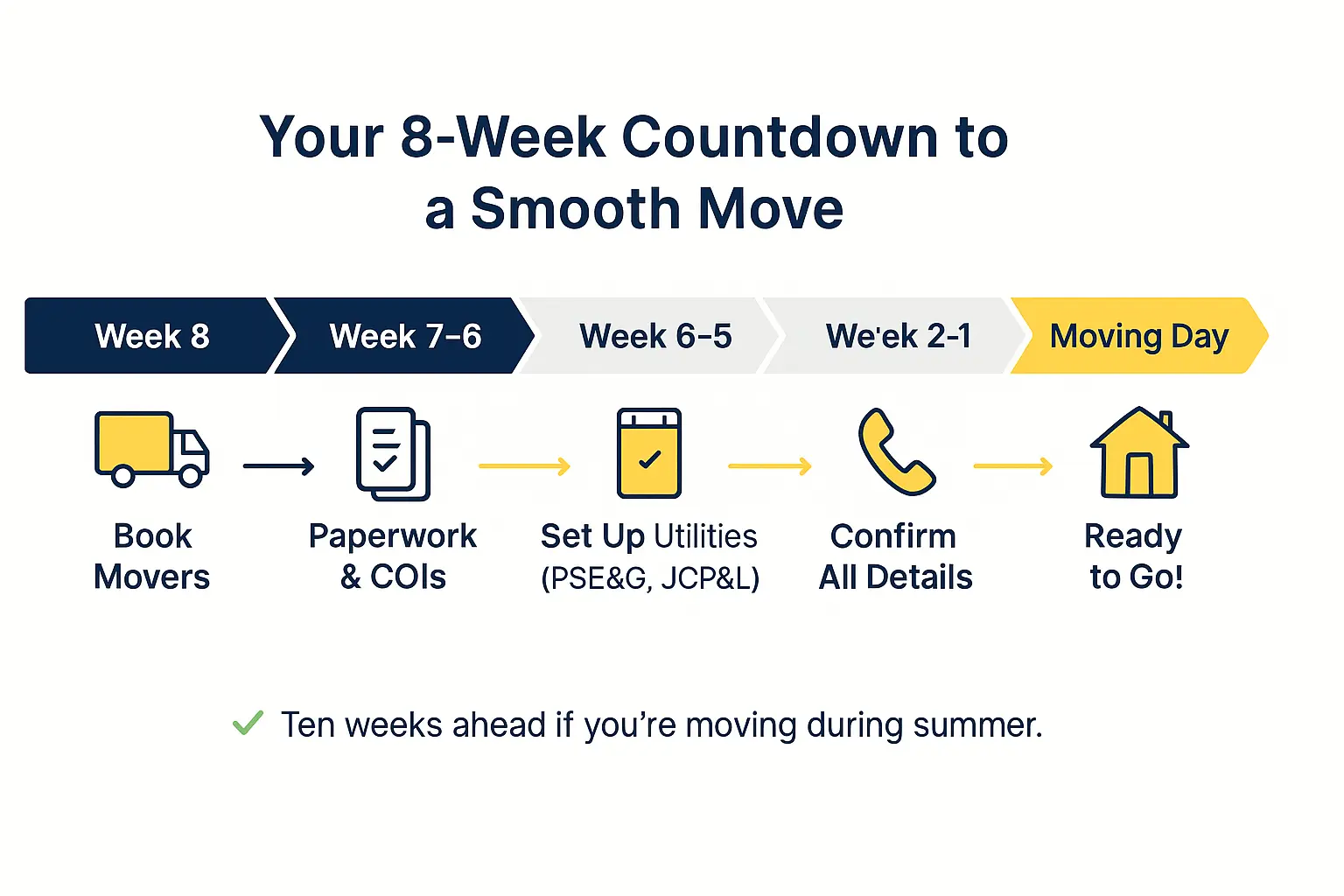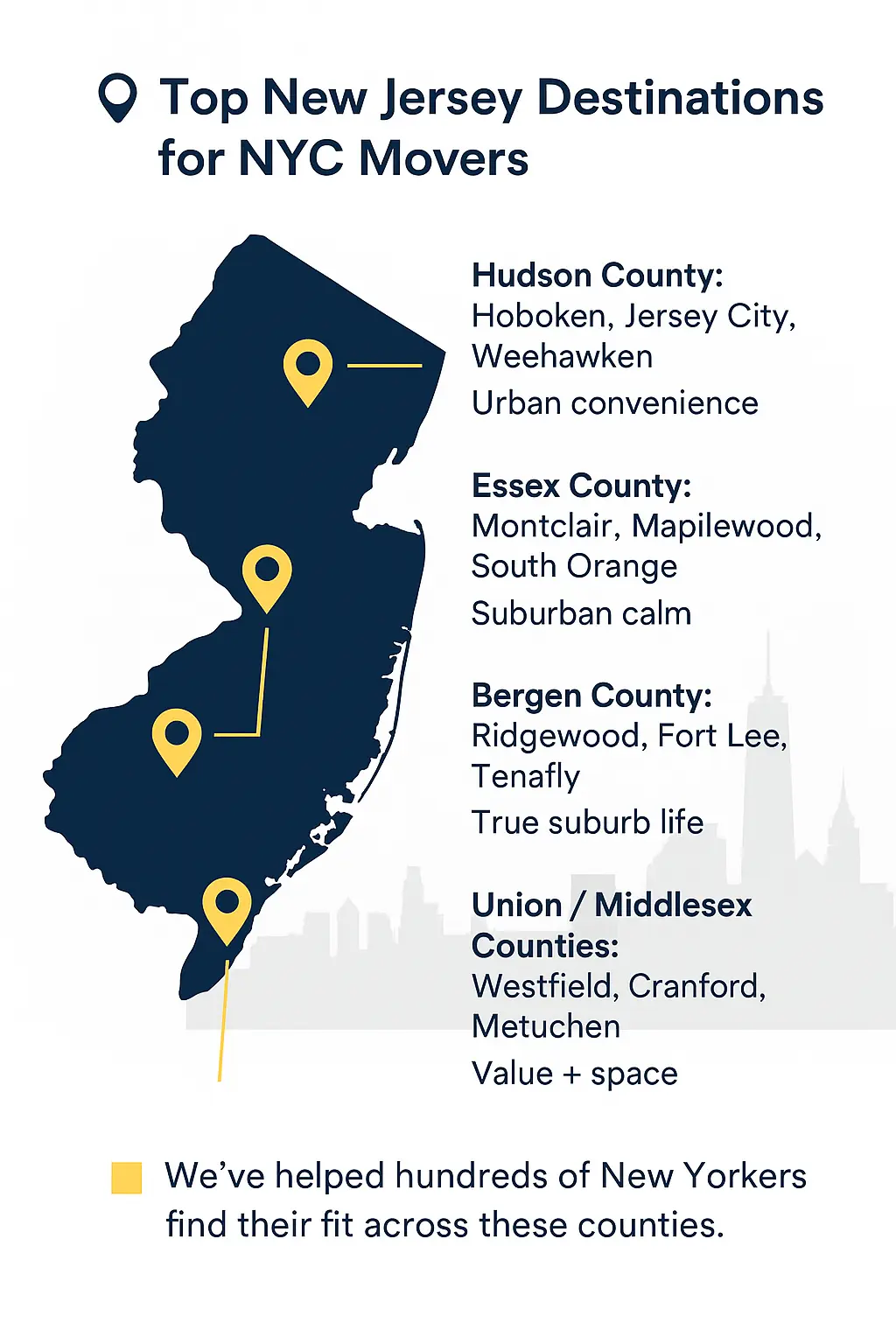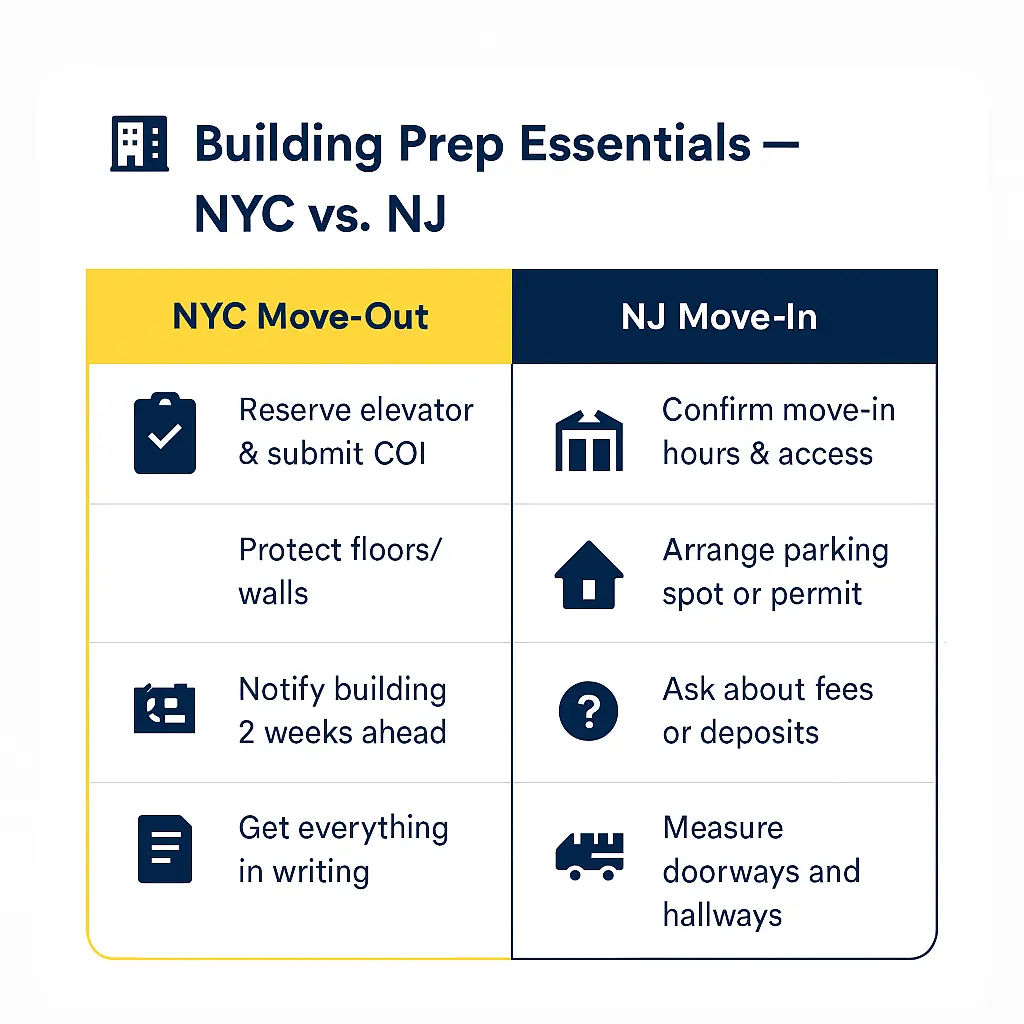Table Of Contents
Moving to New Jersey feels deceptively simple. You're not crossing the country, you might be coming from just across the Hudson.
But here’s what catches most people off guard: New Jersey moves require the same level of planning as a long-distance relocation, plus a few Garden State specifics that can make or break your moving day.
We get it, you’re excited for more space, maybe a yard, maybe a shorter commute, but you also don’t want your move to turn into a logistical nightmare.
Whether you're trading a Manhattan studio for a Hoboken two-bedroom or leaving Brooklyn for a house in Montclair, this guide walks you through everything that actually matters when moving to New Jersey.
Start Planning Eight Weeks Out
The biggest mistake people make with New Jersey moves? Assuming they can wing it because the distance is short.
Start planning eight weeks before moving day. That gives you time to secure permits, compare movers familiar with NJ routes, and manage building requirements on both ends.
If you’re moving during summer, peak season for NYC-to-NJ relocations, extend that to ten weeks.
Your 8-Week Countdown Checklist

Pro Tip: If you’re moving mid-summer, call your mover before you even have your lease signed - popular weekends sell out fast.
What a New Jersey Move Actually Costs
The shorter the distance, the more people underestimate the price.
Here’s what to expect when budgeting your NYC-to-NJ move:
Add-ons that impact cost:
- Walk-ups or long carries from the truck increase labor time.
- Move-in or elevator fees ($100–500) are common in NJ buildings.
- Parking permits can cost around $50 per day per space in Jersey City.
- Bridge or tunnel tolls for trucks apply if your mover bills them separately.
“A move to New Jersey may only span a few miles - but planning like it’s cross-country makes all the difference.”
Want an exact quote for your route? Get your personalized NYC→NJ estimate →
Picking the Right New Jersey Neighborhood
New Jersey isn’t one market, it’s dozens of towns with unique personalities, commutes, and price points.
Here’s how to think about where you’re heading:

Hudson County
Hoboken, Jersey City, Weehawken
Urban, walkable, and closest to NYC. Perfect for professionals who want PATH train access, ferry options, and a vibrant social scene. Think Brooklyn energy with slightly more square footage.
Essex County
Montclair, Maplewood, South Orange
Suburban calm with good schools and real backyards. Great for families moving from smaller city apartments. Expect farmers markets over bodegas, and more space for the same rent.
Bergen County
Ridgewood, Fort Lee, Tenafly
Classic suburbia with top-rated schools. Expect driveways, garages, and quiet evenings - ideal for long-term planners who still want an easy Manhattan commute.
Union & Middlesex Counties
Westfield, Cranford, Metuchen
More affordable, more space, longer commute (45–60 minutes). Great for remote or hybrid workers prioritizing home size and value.
Permits, Parking, and Timing Your Move Right
New Jersey towns take parking seriously and every city has its own rulebook.
Before moving day:
- Jersey City: Requires a parking permit for any commercial vehicle parked longer than 30 minutes.
- Hoboken: Similar rules - strict enforcement, so apply at least a week ahead.
- Other towns: Contact the parking authority early; some allow online applications for temporary permits.
Building scheduling:
Luxury and newer NJ buildings often have specific move-in windows (weekdays only, no Sundays). Share your building contacts with your mover early so they can plan around these restrictions.

Timing tips:
- Avoid 1st and last-of-month moves, they’re chaos citywide.
- Mid-month weekdays offer better pricing and availability.
- Winter: Have a snow contingency plan - trucks can’t navigate unplowed side streets.
- Summer: Watch for extreme heat in buildings without common-area AC.
Pro Tip: Confirm freight elevator times at both addresses at least one week before your move.
Finding a Mover Who Knows the Routes
Not all movers handle NJ relocations well.
You want a company that regularly runs NYC↔NJ routes and understands the quirks of both states.
What to Ask Before Booking
- Have they handled your exact route or building type before?
- What’s their backup plan if they can’t park?
- Are tolls included in the quote?
- Do they provide Certificates of Insurance for both buildings?
- Are they licensed in New Jersey and insured with the Division of Consumer Affairs?
Get at least three detailed quotes.
Professional movers will offer a video walkthrough or on-site estimate. Avoid anyone quoting by phone alone, that’s a red flag for hidden fees.
Every Lifestyle Moving quote is itemized and transparent - no surprises on moving day.
Preparing Both Buildings for Moving Day
Your move happens in two places and both need coordination.

For your current (NYC) building:
- Give notice at least two weeks ahead.
- Confirm service elevator reservations.
- Ask about floor protection or padding requirements.
- Get every rule in writing.
For your new (NJ) building:
- Contact management two weeks before move-in.
- Confirm move-in hours, paperwork, and parking access.
- Ask about any fees or security deposits.
Measure before you move:
Hallways, doors, and stairwells vary widely in NJ homes. That couch that fit in Brooklyn might not make the turn in Montclair. Measure twice - move once.
Prepare your household:
- Arrange childcare or pet care for moving day.
- Pack an essentials box (meds, chargers, important documents, toiletries).
- Keep valuables and essentials with you, not on the truck.
Making Your New Jersey Move Work
The difference between a smooth move and a chaotic one? Preparation.
This isn’t a move to figure out on the fly - you need the right mover, proper permits, and a clear plan.
Start early. Communicate clearly. Build buffer time into your day.
Moving to New Jersey gives you more space, better value, and a calmer lifestyle - the move itself just needs the respect it deserves.
Ready to get specific pricing for your NYC-to-NJ move?
Check out our dedicated New York City to New Jersey page for detailed routes, neighborhood-by-neighborhood costs, and transparent quotes tailored to your exact starting and ending points.
Frequently Asked Questions
How far in advance should I book my New Jersey move?
Book 6–8 weeks ahead, especially during summer. Movers and buildings fill up quickly.
Do I need a parking permit in NJ?
Yes - especially in cities like Hoboken and Jersey City. Apply 5–7 days in advance.
How much does it cost to move to New Jersey from NYC?
Anywhere from $600 to $3,500+ depending on your home size, building type, and access.
What’s the best time to move?
Mid-month weekdays outside of May–September offer the best rates and flexibility.




.webp)